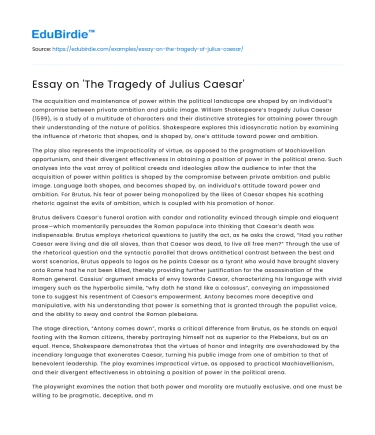The acquisition and maintenance of power within the political landscape are shaped by an individual’s compromise between private ambition and public image. William Shakespeare’s tragedy Julius Caesar (1599), is a study of a multitude of characters and their distinctive strategies for attaining power through their understanding of the nature of politics. Shakespeare explores this idiosyncratic notion by examining the influence of rhetoric that shapes, and is shaped by, one’s attitude toward power and ambition.
The play also represents the impracticality of virtue, as opposed to the pragmatism of Machiavellian opportunism, and their divergent effectiveness in obtaining a position of power in the political arena. Such analyses into the vast array of political creeds and ideologies allow the audience to infer that the acquisition of power within politics is shaped by the compromise between private ambition and public image. Language both shapes, and becomes shaped by, an individual’s attitude toward power and ambition. For Brutus, his fear of power being monopolized by the likes of Caesar shapes his scathing rhetoric against the evils of ambition, which is coupled with his promotion of honor.
Save your time!
We can take care of your essay
- Proper editing and formatting
- Free revision, title page, and bibliography
- Flexible prices and money-back guarantee
Brutus delivers Caesar’s funeral oration with candor and rationality evinced through simple and eloquent prose—which momentarily persuades the Roman populace into thinking that Caesar’s death was indispensable. Brutus employs rhetorical questions to justify the act, as he asks the crowd, “Had you rather Caesar were living and die all slaves, than that Caesar was dead, to live all free men?” Through the use of the rhetorical question and the syntactic parallel that draws antithetical contrast between the best and worst scenarios, Brutus appeals to logos as he paints Caesar as a tyrant who would have brought slavery onto Rome had he not been killed, thereby providing further justification for the assassination of the Roman general. Cassius’ argument smacks of envy towards Caesar, characterizing his language with vivid imagery such as the hyperbolic simile, “why doth he stand like a colossus”, conveying an impassioned tone to suggest his resentment of Caesar’s empowerment. Antony becomes more deceptive and manipulative, with his understanding that power is something that is granted through the populist voice, and the ability to sway and control the Roman plebeians.
The stage direction, “Antony comes down”, marks a critical difference from Brutus, as he stands on equal footing with the Roman citizens, thereby portraying himself not as superior to the Plebeians, but as an equal. Hence, Shakespeare demonstrates that the virtues of honor and integrity are overshadowed by the incendiary language that exonerates Caesar, turning his public image from one of ambition to that of benevolent leadership. The play examines impractical virtue, as opposed to practical Machiavellianism, and their divergent effectiveness in obtaining a position of power in the political arena.
The playwright examines the notion that both power and morality are mutually exclusive, and one must be willing to be pragmatic, deceptive, and manipulative in order to seize it; being honorable and moral, while virtuous, can also prove cumbersome. The line, “I slew my best lover for the good of Rome, I have the same dagger for myself when it shall please my country to need my death.” Acts as proof, for taking the ‘dagger’ for himself would prove his commitment to placing the ‘good of Rome’ above both his personal affections and desires. However, such selfless, moral idealism of Brutus, is defeated by the Machiavellian pragmatism of Antony. This ‘clash’ between the two conflicting political creeds can be first observed in the scene where Antony persuades Brutus into allowing him to deliver a funeral oration at Caesar’s funeral.
Antony feigns acquiescence in order to exact his vengeance on Caesar onto the conspirators, as shown in his sarcastic repetition of the phrase, “For Brutus is an honorable man”, as he consistently hits upon the notes of Brutus’ honor in a cadence which damages the moral authority and credibility of the figure whose claim to virtue is now brought to question. Antony’s theatrical panache of, “Bear with me, / My heart is in the Coffin there with Caesar”, crafts a verisimilitude of loyalty that is defined against the betrayal of the conspirators. Antony exemplifies, that the art of persuasion is not far removed in the play from the craft of manipulation. Antony, with his calculated histrionics and evocative rhetoric, is able to incite righteous indignation from within the crowd, as he plays to the audience’s pathos more so than logos. The syntactic echo among the citizens who cry, “O woeful day”, “O traitors, villains”, and “O most bloody sight”, creates a unified voice of outrage, proving that Antony’s appeal to passion far outweighs Brutus’ previous appeal to reason.
Thus, the Machiavellianism of Antony trumps the code of virtue by which Brutus abides in a show of political dissension. The notion that the acquisition and maintenance of power within the political landscape is shaped by an individual’s compromise between private ambition and public image is displayed in ‘Julius Caesar’ through two thematic concerns. The first of which is the idea that rhetoric and language both shape and become shaped by, an individual’s attitude towards power and ambition. Additionally, the playwright explores impractical virtue, in contrast with the practicality of Machiavellianism, and their distinctive effectiveness in the attainment of power within politics. It is through these deeper understandings of the conceptions that the dynamics of power and ambition become clearer.






 Stuck on your essay?
Stuck on your essay?

